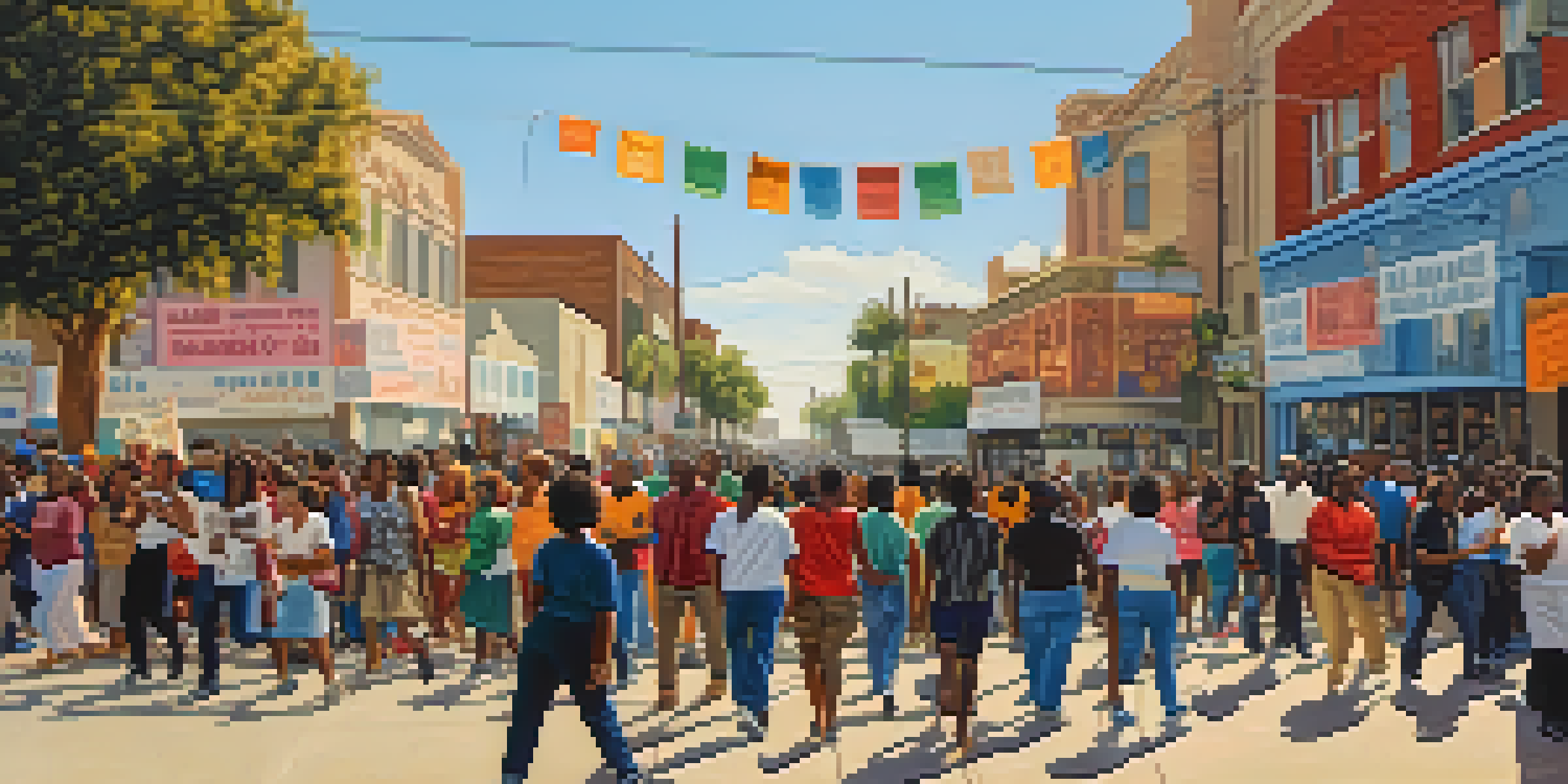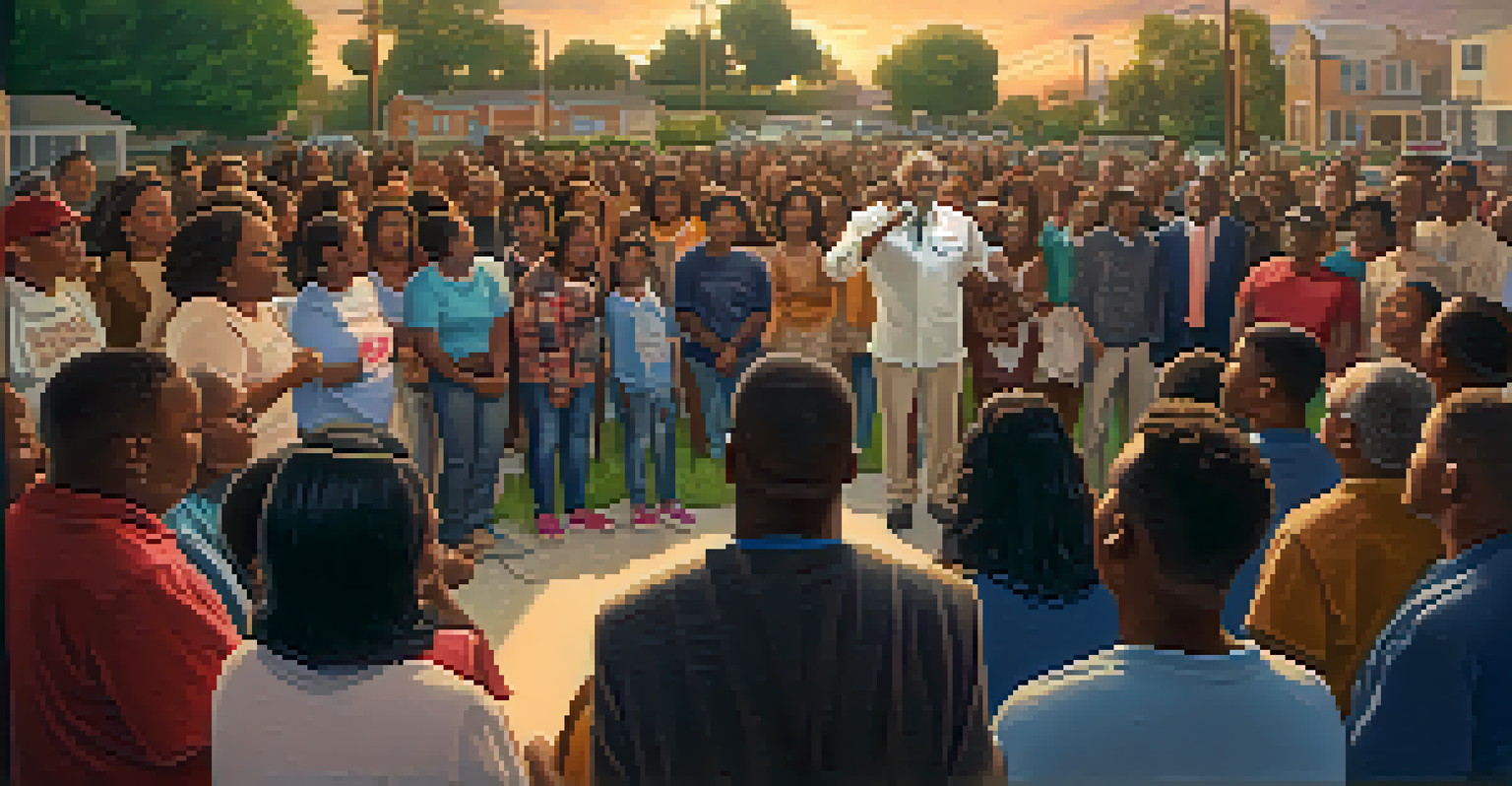The Impact of Civil Rights Movements on Compton’s Policies

Understanding Compton's Historical Context
To grasp the impact of civil rights movements on Compton, we first need to understand the city’s historical context. Founded in the late 19th century, Compton began as a predominantly white community. However, post-World War II migration patterns led to significant demographic changes, with many African Americans moving to the area for better opportunities. This shift laid the groundwork for a pressing need for civil rights advocacy as residents sought to address social and economic inequalities.
Injustice anywhere is a threat to justice everywhere.
As the population evolved, so did the challenges faced by its residents. The struggle for civil rights became increasingly necessary as systemic discrimination persisted. Issues such as housing segregation, unequal education, and police brutality sparked community activism. The grassroots efforts of local leaders and organizations began to shape the narrative of Compton, highlighting the urgent need for change.
Understanding this backdrop allows us to appreciate the significance of the civil rights movements that followed. They were not just historical events; they were a response to the lived experiences of Compton's residents. This context is critical for examining the specific policies that emerged as a result of these movements.
Key Civil Rights Events in Compton
Several pivotal events marked the civil rights landscape in Compton. One such moment was the establishment of the Compton chapter of the NAACP in the 1950s, which aimed to combat racial discrimination and promote social justice. This chapter mobilized residents to advocate for their rights, pushing for legislative changes that would benefit the community as a whole.

Another significant event was the 1965 Watts riots, which, while centered in a neighboring area, had profound effects on Compton. The unrest highlighted the frustrations of African American communities across Los Angeles County, including Compton. In the aftermath, local leaders recognized the need for more effective dialogue between residents and law enforcement, prompting discussions around policing policies.
Civil Rights Shaped Compton's Policies
The civil rights movements in Compton led to significant changes in education, housing, law enforcement, and economic development, addressing systemic inequalities.
These events served as catalysts for community organizing and activism, leading to a stronger collective voice. They created an environment where residents could demand change and hold local government accountable, setting the stage for policy reform.
Influence on Education Policies
One of the most significant areas affected by the civil rights movements in Compton was education. Activists pushed for equal access to quality education, which had been historically denied to African American students. Their efforts led to the desegregation of schools, allowing students from diverse backgrounds to learn together and benefit from the same resources.
The time is always right to do what is right.
In the late 1960s, local school boards began to implement affirmative action policies aimed at increasing diversity among staff and student bodies. This was a direct response to the demands of civil rights activists who sought to create an inclusive educational environment. As a result, the curriculum started to incorporate African American history and culture, fostering a sense of pride and identity among students.
The impact of these educational reforms extended beyond the classroom. They empowered a generation of young activists who would go on to advocate for further change in their communities, demonstrating the long-lasting effects of civil rights movements on Compton's educational policies.
Changes in Housing Policies
Civil rights movements also significantly influenced housing policies in Compton. Activists fought against discriminatory practices like redlining, which restricted African American families from accessing home loans and purchasing property. Their relentless advocacy led to increased awareness and eventual policy changes aimed at promoting fair housing.
In the 1970s, the Fair Housing Act was enforced more stringently in Compton, which helped to dismantle barriers to homeownership. Community organizations played a vital role in educating residents about their rights and assisting them in navigating the housing market. This empowerment was crucial in fostering a sense of stability and belonging within the community.
Community Activism Fostered Change
Grassroots efforts by local leaders and organizations empowered residents to demand change and hold local authorities accountable.
The changes in housing policies not only improved living conditions for many families but also contributed to the overall economic development of Compton. As residents gained access to homeownership, they were able to invest in their properties and neighborhoods, creating a positive feedback loop of growth and improvement.
Impact on Law Enforcement Strategies
The civil rights movements prompted significant changes in law enforcement strategies in Compton. Following heightened tensions and incidents of police brutality, community leaders demanded accountability and transparency from local law enforcement agencies. These calls for reform led to the implementation of community policing initiatives aimed at building trust between officers and residents.
Through workshops and public forums, citizens were encouraged to voice their concerns and participate in discussions about policing practices. This collaborative approach helped reshape how law enforcement interacted with the community, emphasizing prevention and relationship-building rather than militarization and enforcement.
As a result of these efforts, policies that prioritized community safety and engagement emerged. The ongoing dialogue between residents and police aimed to address issues collaboratively, demonstrating the power of civil rights activism in shaping local governance.
Economic Development and Civil Rights
Economic development in Compton was also closely tied to the civil rights movements. Activists recognized that economic empowerment was crucial for achieving social justice, leading to initiatives that supported local businesses and job creation. This focus on economic equity was a direct response to the systemic barriers that had historically limited opportunities for African Americans.
Local organizations began to advocate for fair employment practices and training programs that would equip residents with skills necessary for the job market. By fostering entrepreneurship and supporting minority-owned businesses, the community aimed to stimulate economic growth and reduce unemployment rates among its residents.
Legacy of Activism Inspires Future
The enduring legacy of civil rights movements continues to inspire new generations in their pursuit of justice and equality in Compton.
These efforts culminated in policies that prioritized economic development as a means of promoting equality. The synergy between civil rights activism and economic initiatives not only improved the financial landscape of Compton but also fostered a sense of hope and resilience among its residents.
Legacy of Civil Rights Movements in Compton
The legacy of civil rights movements in Compton is profound and enduring. The policy changes that emerged from these movements not only addressed immediate issues but also laid the groundwork for future generations. They instilled a sense of civic engagement and responsibility among residents, encouraging them to continue advocating for their rights.
Today, many of the policies born from civil rights activism are still in place, serving as a reminder of the power of collective action. The ongoing efforts to promote equality, justice, and community empowerment reflect the spirit of those who fought tirelessly for change. This legacy continues to inspire new generations of activists.

As Compton navigates contemporary challenges, the lessons learned from the civil rights movements remain relevant. They remind us that the pursuit of justice and equality is an ongoing journey, one that requires the commitment and participation of the entire community.